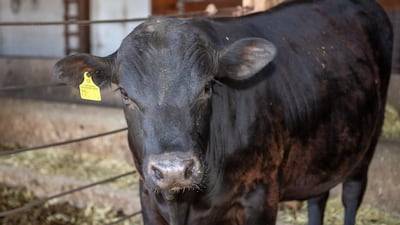Scientists have created gene-edited farm animals that could help improve food production and save endangered species.
Pigs, goats and cattle have been engineered so that they become elite species which can produce sperm with traits such as disease resistance and higher meat quality.
Researchers developed the system in mice and then tried larger animals. They used a gene-editing tool to shut the male fertility gene, and then injected sperm-producing cells from donor animals.
A team from the Roslin Institute at Edinburgh University, which created the world's first adult cloned mammal – Dolly the sheep – worked on the "super sires" project with three US universities.
“This shows the world that the technology is real. It removes the need for artificial insemination or any surgical intervention. Your animals become an artificial insemination unit,” said Professor Bruce Whitelaw, interim director at Roslin.
The animals, created using a gene-editing tool called CRISPR-Cas9, are essentially sterile blank slates that could then be transplanted with stem cells that produce the desired sperm, the scientists said.
The process could help farmers rear healthier, more productive animals using fewer resources such as feed, medicines and water, they said.
It could also give breeders in remote regions of the world better access to genetic material from elite animals from elsewhere, allowing for "precision breeding".
"If we can tackle this genetically, then that means less water, less feed and fewer antibiotics we have to put into the animals," said Jon Oatley, a reproductive biologist at Washington State University in the US, who co-led the work.
“We can get better dissemination of desirable traits and improve the efficiency of food production.”
Researchers also said the technology could be used to help endangered species recover. They hoped the technique could use the frozen sperm of an endangered animal to help its kind survive.
Gene-edited animals have not yet been approved for human consumption in the UK, and there are several ethical questions surrounding the possibility.
Dr Helen Wallace, director of the non-profit GeneWatch UK, said the advances came at the cost in the dead animals of failed experiments.
"The process of producing surrogate sires is likely to harm animals, as genetic engineering, including gene editing, involves many failed attempts, particularly in mammals," she told the UK's Telegraph newspaper.
"There are usually multiple stillbirths and early deaths during the process of producing one gene edited animal. In addition, it is still unclear whether this will ever work in farm animals.”
Dolly, born on 5 July 1996, was the world’s first mammal cloned from an adult somatic cell. She had three mothers: one provided the egg, another the DNA, and a third carried the cloned embryo to term.


